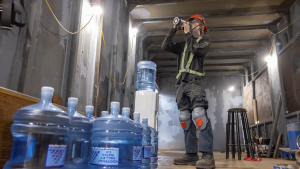Ontario’s Building Trades have thrown their weight behind a growing effort to bring dignity and improved hygiene to jobsites by upgrading washroom facilities.
The campaign is building on the program initiated by the BC Building Trades under the banner Get Flushed. Delegates attending the Provincial Building and Construction Trades Council of Ontario’s conference in Niagara Falls earlier this month approved a resolution calling for a Canada-wide washroom improvement program and meetings with Ontario Minister of Labour Monte McNaughton.
Richard Hayter, Ottawa-based community relations director of the Building Trades Council and architect of the resolution, said the Dignity and Respect Committee is carrying the torch for trades business managers and other stakeholders going back decades who have been frustrated with the lack of progress on improving sanitary conditions on Canadian jobsites.

“We aim to bring dignity to the workforce, to improve the general health of the workforce, avoiding all of the occupational infectious diseases that are there and the biohazards,” said Hayter.
Post COVID, after such attention was paid to the health hazards of worksites with a heightened awareness that lack of hygiene can lead to the spread of not only COVID but colds, the flu, Hepatitis A, E. coli and other diseases, argues Hayter, no longer can the industry say the degrading conditions of washroom facilities are “just the way it is” on sites.
“We’ve reached a point where there’s a general movement to improve the health of workers,” he said. “And that starts with sanitary and hygienic washing facilities.”
The BC Building Trades published its Report on Washroom Facilities in the Construction Industry in spring 2021, commissioning the Harwood Safety Group.
The report found using non-plumbed washroom facilities ran afoul of provincial occupational health and safety laws and were counter to worker recruitment and retention goals, particularly of women. Research proved employers’ complaints that installing plumbed sanitation stations would be too costly were off the mark: a plumbed two-station trailer that includes men’s and women’s sides, flushing toilets, water, soap, toilet paper and paper towels could be obtained for $2,500 per month.
Comments from B.C. construction workers registered their disgust at having to work at sites with porta-potties that seem to hardly ever be cleaned: “The general rule is that if you haven’t used the porta-potty by 7 a.m. on a Monday, then don’t bother using it,” said one; “The porta-potties on the construction sites I’ve worked on were cleaned once a week. Sometimes the waste gets higher than the toilet seat,” said another.
Recommendations included a commitment to the use of modern, plumbed washrooms on construction sites; following Health Canada and WorkSafeBC guidance on cleaning washrooms; ensuring washrooms are no more than 60 metres away from working spaces; and ensuring units have heating and lighting.

Hayter and colleagues have continued to gather evidence of the negative consequences of poor facilities.
Workers without access to clean drinking water become dehydrated and he noted a one per cent reduction in hydration leads to a 12 per cent reduction in performance and productivity. Quebec’s FTQ undertook exit interviews of workers who quit the business and found poor washroom facilities were a notable factor.
It has been found that every dollar invested in washroom improvements delivers a $4.30 return in the form of lower WSIB costs.
“People have reached that saturation point where they couldn’t take it anymore, because when you have the stress of a construction site…people are reacting negatively to the washrooms, they just can’t take it,” he said of the Quebec research.
The Building Trades resolution stated construction workers are only looking for the same quality of facilities that Canada’s other 17 million workers enjoy. Women would enjoy greater privacy and freedom from biohazards and infectious diseases; better facilities would extend careers; and improvements would “instil a greater sense of dignity and respect with a higher level of worker productivity.”
Hayter said the advocates have already reached out to executives of Skilled Trades Ontario with positive feedback, and the next step would be discussions with McNaughton.
“It is quite clear that we are exposing workers to undue risks, which I think the WSIB would have a problem with, and we’re not meeting all the conditions of the Occupational Health and Safety Act, which you would expect that the Ministry of Labour to have a strong interest in,” said Hayter.
Follow the author on Twitter @DonWall_DCN.











Recent Comments